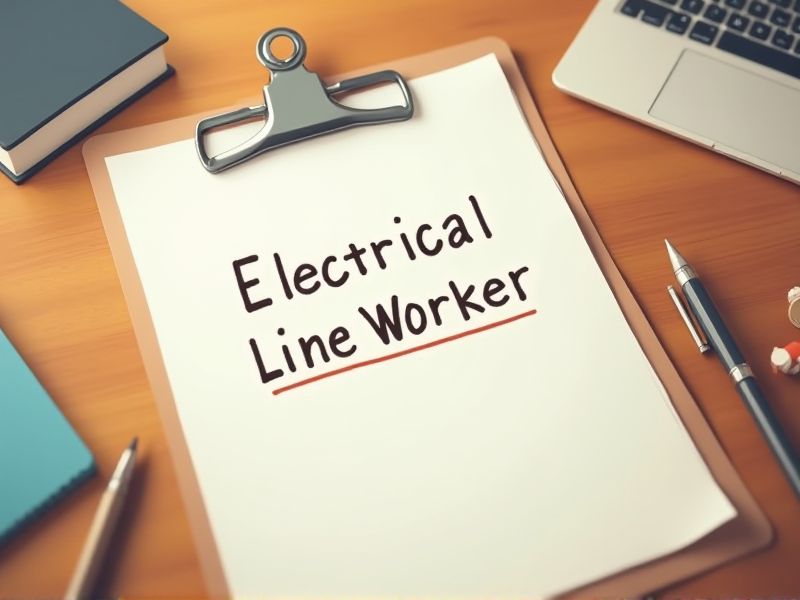
The role of an Electrical Line Worker involves intricate tasks that ensure the reliable transmission and distribution of electricity. Handling high-voltage equipment and maintaining power lines require a deep understanding of safety protocols and technical operations. Certifications provide workers with essential knowledge and skills, reducing the risk of accidents and improving service efficiency. Some important certifications you may need for an Electrical Line Worker include:
OSHA 10-Hour Construction Safety Certification
Electrical line workers often face high-risk environments, which necessitates training like the OSHA 10-Hour Construction Safety Certification to enhance awareness and promote safe work practices. This certification provides foundational knowledge on crucial safety topics, decreasing the likelihood of accidents and injuries. Employers prioritize hiring certified workers as it can lead to reduced workplace incidents, which can mitigate costs related to worker's compensation and downtime. The program supports standardizing safety protocols, fostering a culture of safety that aligns with industry regulations and legal requirements.
OSHA 30-Hour Construction Safety Certification
OSHA 30-Hour Construction Safety Certification is needed for electrical line workers to ensure they are equipped with the comprehensive knowledge to identify and mitigate workplace hazards. This certification focuses on specific construction safety standards that are crucial for high-risk jobs like electrical line work. By gaining these insights, line workers are better prepared to adhere to regulations, reducing the likelihood of accidents and injuries on the job. Employers benefit from a more safety-conscious workforce, which can lead to decreased liability and enhanced operational efficiency.
CPR and First Aid Certification
Electrical line workers often face potential hazards including high-voltage exposure, so CPR and First Aid certification equips them to respond to electrical shock emergencies, minimizing the risk of fatality. Working in remote locations, these workers may encounter delays in accessing professional medical help, making on-the-spot first aid crucial for maintaining safety. In compliance with occupational safety regulations, holding a CPR and First Aid certification is often mandated to ensure that workers are prepared for various emergency scenarios. By being certified, electrical line workers contribute to a safer work environment, enhancing team confidence and operational effectiveness.
NFPA 70E Electrical Safety Certification
Electrical Line Workers face significant risks from electrical hazards, and NFPA 70E Electrical Safety Certification provides the necessary guidelines to reduce the likelihood of electrical accidents. By obtaining this certification, workers gain essential knowledge and skills to identify potential electrical hazards, which directly decreases the probability of on-the-job injuries or fatalities. Employers also benefit from reduced liability and improved compliance with regulatory standards, creating a safer work environment. The certification encourages the adoption of best practices, fostering a culture of safety that can lead to fewer incidents and operational disruptions.
Arc Flash Awareness Training Certification
Arc Flash Awareness Training Certification is crucial for electrical line workers because it equips them with the knowledge to recognize and mitigate the risks associated with arc flash incidents. Such incidents can cause severe injuries or fatalities, thus training is essential in reducing these risks and ensuring worker safety. The certification also aligns with regulatory compliance, ensuring companies adhere to safety standards and avoid legal repercussions. Furthermore, trained workers contribute to a safer work environment and enhance operational efficiency by minimizing accident-related interruptions.
Lockout/Tagout (LOTO) Certification
Lockout/Tagout (LOTO) Certification is essential for electrical line workers because it prevents accidental energization during maintenance, reducing the risk of electrical shock. It ensures that all energy sources are effectively isolated, providing a safer work environment. Workers with LOTO certification are better prepared to recognize hazards associated with energy control procedures. Compliance with LOTO standards is mandated by OSHA, helping organizations avoid potential legal and financial penalties.
Certified Electrical Line Worker Training
Certified Electrical Line Worker Training is essential because it ensures workers are equipped with the skills to safely handle high-voltage power lines and prevent accidents. Without the proper training, line workers are at a higher risk of injuries or fatalities due to falls, electrocution, or equipment failure. This training also increases efficiency and reliability in power distribution by teaching advanced techniques and troubleshooting skills. Certification provides a standardized measure of competency, fostering trust and reliance among employers, clients, and the broader community.
Fall Protection and Rescue Certification
Electrical line workers operate at elevated heights, which poses a significant risk of falls without proper safety measures. Fall protection and rescue certification equips them with the skills needed to use harnesses and fall arrest systems effectively, reducing accidents. The certification ensures that workers are trained to execute rescue operations in emergency situations, minimizing response time and enhancing crew safety. Compliance with industry standards and regulations, such as OSHA guidelines, mandates such certifications to maintain workplace safety and reduce liability.
Confined Space Entry Certification
Confined Space Entry Certification is required for electrical line workers because they often need to work in environments with limited access and restricted airflow, which can pose significant safety hazards. Certified training ensures that these workers understand the potential risks, such as oxygen deficiency and the presence of toxic gases. Proper certification provides workers with the skills to use protective equipment and emergency protocols effectively. This, in turn, helps to minimize workplace accidents and enhance overall safety compliance.
High Voltage Safety Training Certification
Electrical line workers face inherent risks when dealing with high-voltage systems, where training ensures they can safely manage these hazards. A certification in high-voltage safety equips them with vital knowledge and techniques to prevent electrical accidents and injuries. Employers mandate such training to comply with industry safety standards and regulations, reducing liability and enhancing job safety. High voltage safety certification fosters a culture of safety awareness, reducing incidents and promoting operational efficiency.
Summary
When you obtain certifications as an Electrical Line Worker, your employability improves due to validated expertise. Employers are more likely to recognize your skill proficiency, resulting in increased job opportunities. Certified workers often experience higher earning potential, aligning with industry standards. Your professional credibility strengthens, enhancing industry reputation and career advancement prospects.
